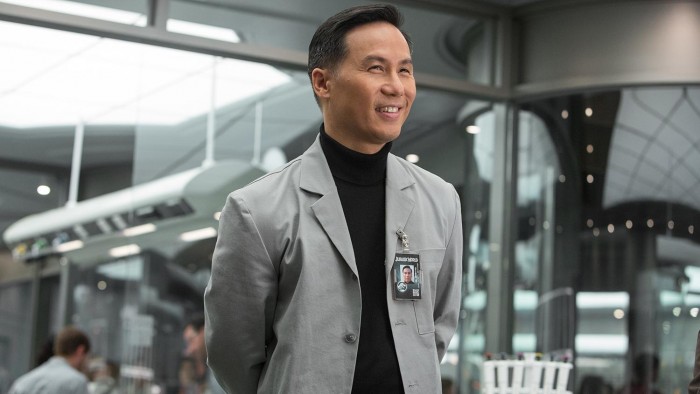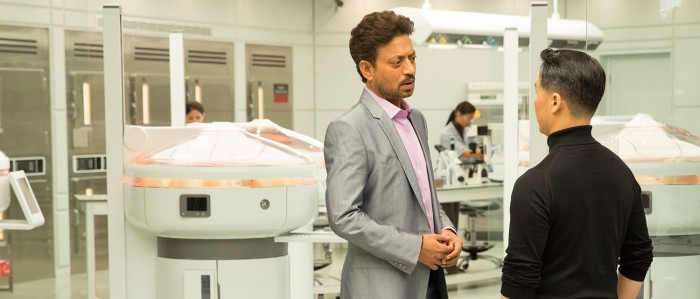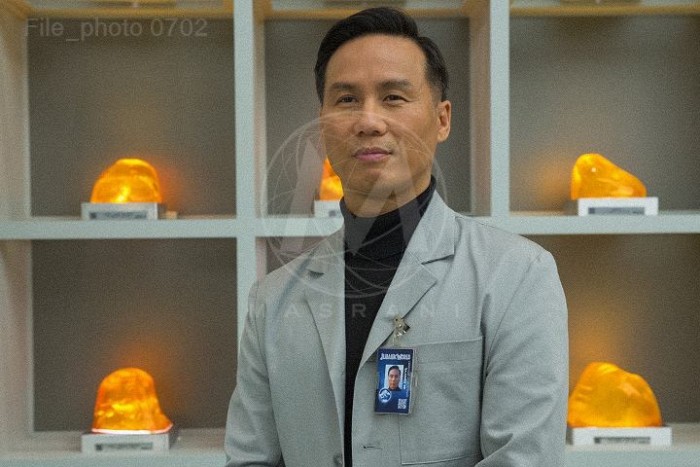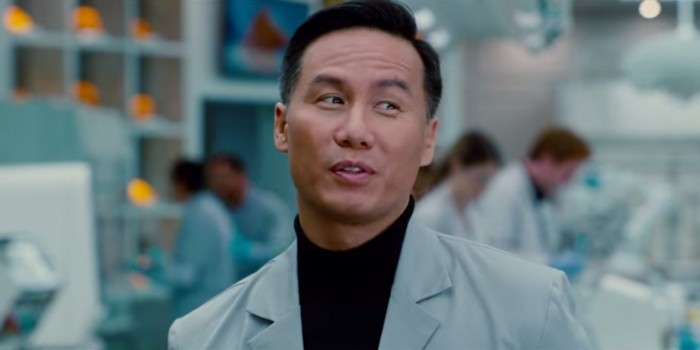Interview: B.D. Wong Talks Returning To 'Jurassic World' As Dr. Henry Wu
The following interview comes from Courtney Howard:
Actor B.D. Wong has played an assistant to a flamboyant wedding planner (Father of The Bride), a mobster (Mystery Date), and, for eleven years, a psychologist (Law & Order: Special Victims Unit). He also won many awards, including a Tony, for his breakout role in the play M. Butterfly. Now, with director Colin Trevorrow's Jurassic World, he's slipping back into the lab coat of a character he originated twenty-two years ago in director Steven Spielberg's Jurassic Park. Dr. Henry Wu has returned – and he's created bigger, badder, bolder dinosaurs this time around.
At the film's recent press tour, we spoke with Wong over the phone about everything from being the only character in the franchise to return, to the level of secrecy around the film, to how to nail tongue-twisting dialogue perfectly. Read the BD Wong Jurassic World interview after the jump.
BD Wong Jurassic World Interview
 How was it putting on Dr. Wu's lab coat again? And what was it like being the only cast member from the original to return?
How was it putting on Dr. Wu's lab coat again? And what was it like being the only cast member from the original to return?
It feels great. It's an aspect of being in the movies that rarely ever happens. I think it's really fun for me. Not only for me to be playing the same character, but also for it to be so long. I really have a great respect and admiration for Colin. Colin made me feel great about it and welcomed me back into it; that made me feel good. I guess part of it is that I felt a little left out of the first one. This was a really sweet return to putting some finishing touches on a character that felt to me rather slim.
 You have that really phenomenal scene with Irrfan Khan which made me wonder if you think your character is a "villain" or if he, as a doctor, got too wrapped up in playing God. Was he maybe buying into the company's rhetoric?
You have that really phenomenal scene with Irrfan Khan which made me wonder if you think your character is a "villain" or if he, as a doctor, got too wrapped up in playing God. Was he maybe buying into the company's rhetoric?
That's interesting, right? When you are playing a guy like this and you're using your body to embody that, you owe it to yourself to understand it as well as you can. I think he makes perfect sense to me. I think he's a guy who is doing such amazing things. You can call it "playing God," but I don't call it that at all. I think he believes so strongly in what he's doing. He's saying, "The world is changing and we're the ones changing it!" Who would not want to be in that position, or continue to push forward all the things he's pushing forward regardless of the consequences? The fact is whatever that's happening that's terrible, he's easily able to justify it. There is an element of denial there, because human life to a doctor is a precious thing that you should put first and foremost above all other things, but he does also see "I gotta get the credit I deserve for this unbelievable thing that I've done." This is the downfall of a lot of people with great accomplishments. If we throw our fellow human under the bus for something we think is great, that's terrible. It's also easy for me to understand how he does it. What he's doing is so unique that of course he's going to feel that way. I had no problem reaching for that.
 How secretive were they when they gave you the script? Did they just give you the pages of your scenes, or did you get to read the whole script?
How secretive were they when they gave you the script? Did they just give you the pages of your scenes, or did you get to read the whole script?
Actually it was very similar to the first movie – in a way that I've never experienced on any other movie. They were very secretive of the script. In both occasions – I'm not sure if they knew this about each other – I had to drive to the production offices, sit in the office, read the script in a closed room, and give the script back. There's nothing negative about it at all – that's how they do it. In both movies there was this sense of security. At that point, I know everything. It's all in my head. I've crossed over to the other side where I know everything about what's going on. For the very first part of pre-production, the movie had a different title so people wouldn't know. For the whole production I was there it was called Ebb Tide. That was on all of our badges. You feel like you're in some kind of wonderful club when you're doing something like that.
You must have felt intense pressure to keep quiet.
Yeah, that's right! You know, I'm trying to not get all bent out of shape about something. I'm going, "C'mon, you guys! This is just a movie. Why are we being so dramatic about all this?" But when you and I are talking, you do understand. The success of the storytellers – we're only as good as what we can withhold from the audience. Aspects of surprise and letting things play out for the audience; it's so much a part of their enjoyment. It's one of the great things about working in the movies and being a great storyteller.
 You say some pretty science-based lingo in this film. I'm constantly curious as to the actor's process in getting the pronunciation right. You've had some training from Law And Order: SVU when your character talks about mental disorders and such.
You say some pretty science-based lingo in this film. I'm constantly curious as to the actor's process in getting the pronunciation right. You've had some training from Law And Order: SVU when your character talks about mental disorders and such.
There are two secrets to it, and they're really banal. I was on SVU for 11 years. I developed a muscle in my brain that could memorize things much more easily than people who don't do it every day. I got used to the language, and some of it got to be repetitive language, so you build your vocabulary. I had a great head writer who was a doctor, who created the character I played to bring a medical perspective to that particular show. It was a very helpful tool to do what you're saying – to say these things with a certain amount of conviction. The other thing that you do, and Colin will tell you this for sure in regards to me, is that you have to blow a lot of takes. You have to blow tons of film so you can get it to be perfect. They won't use it if you aren't letter perfect or on point or hesitating. In this movie, there's no question I did that. To me it's not as mysterious to you or others. It's the kind of part that makes being an actor interesting – you say things you never say. If I played characters who were like me I'd be super bored. This is a good example of how un-boring my job can be.
JURASSIC WORLD opens on June 12.
